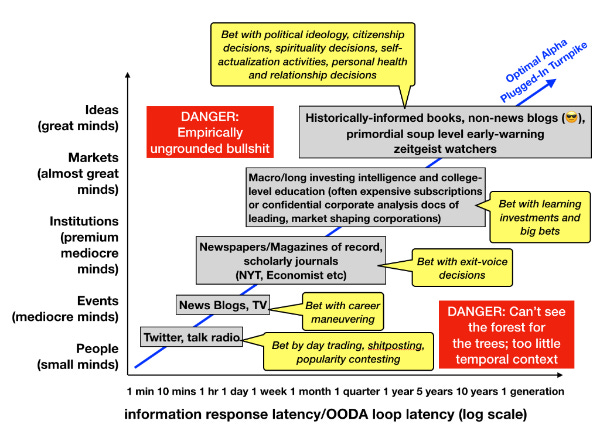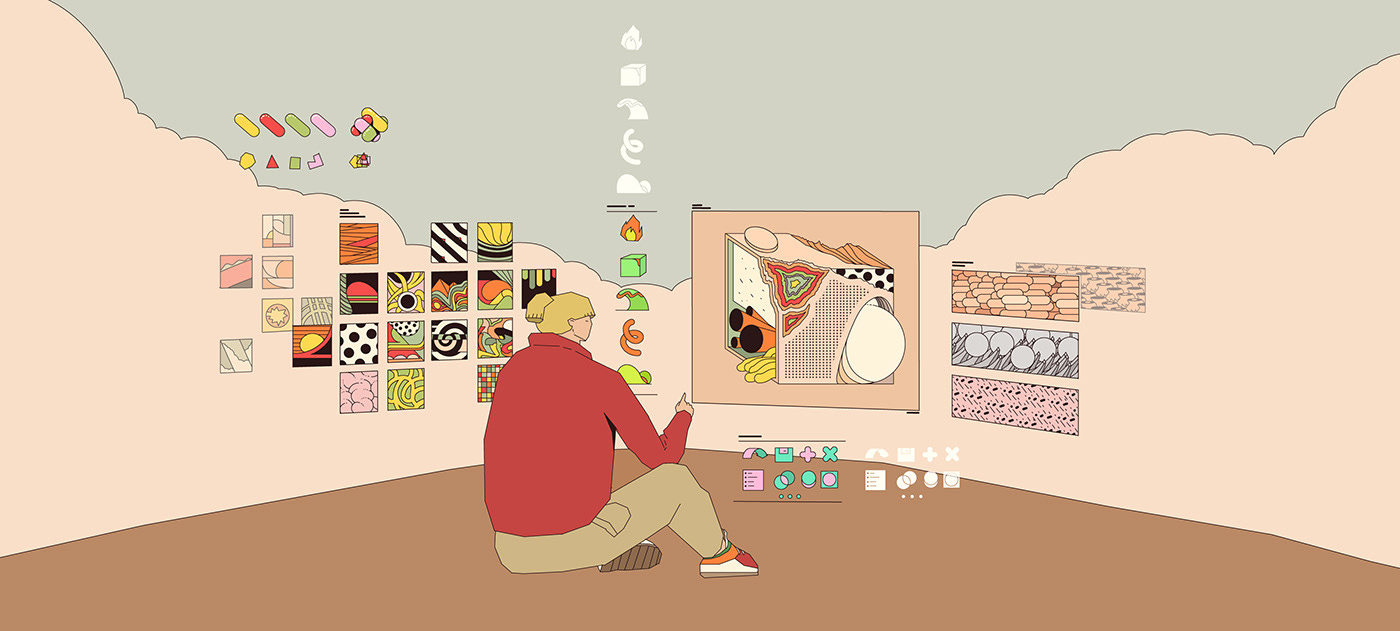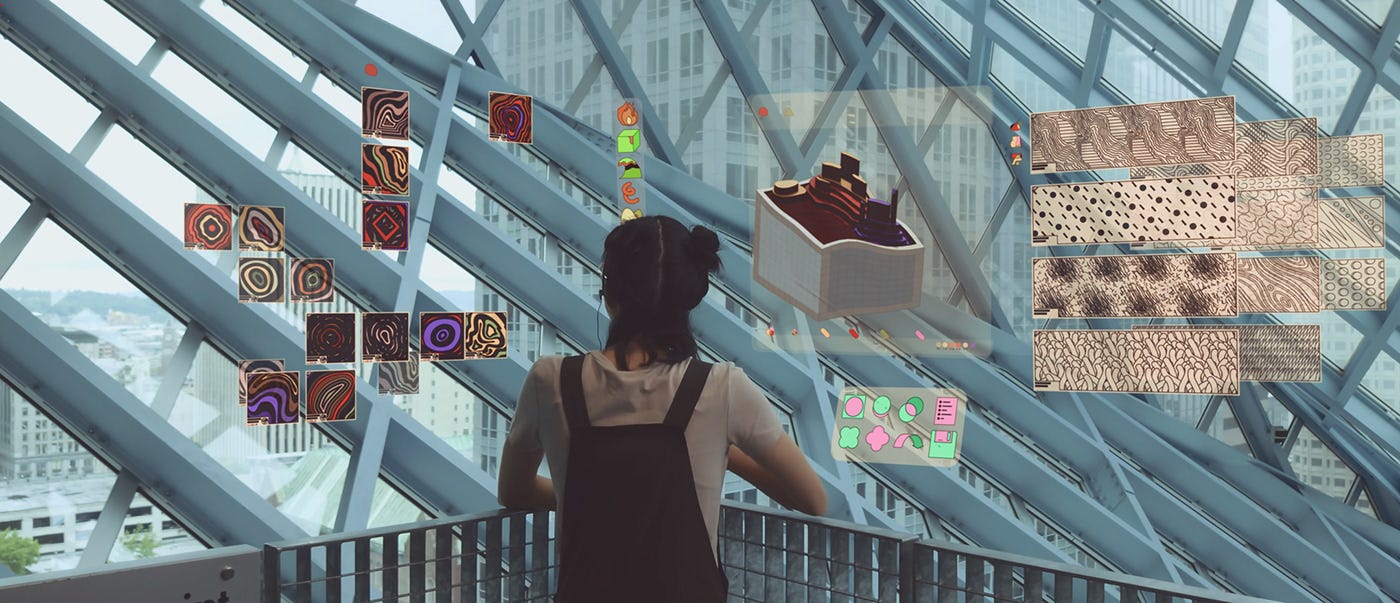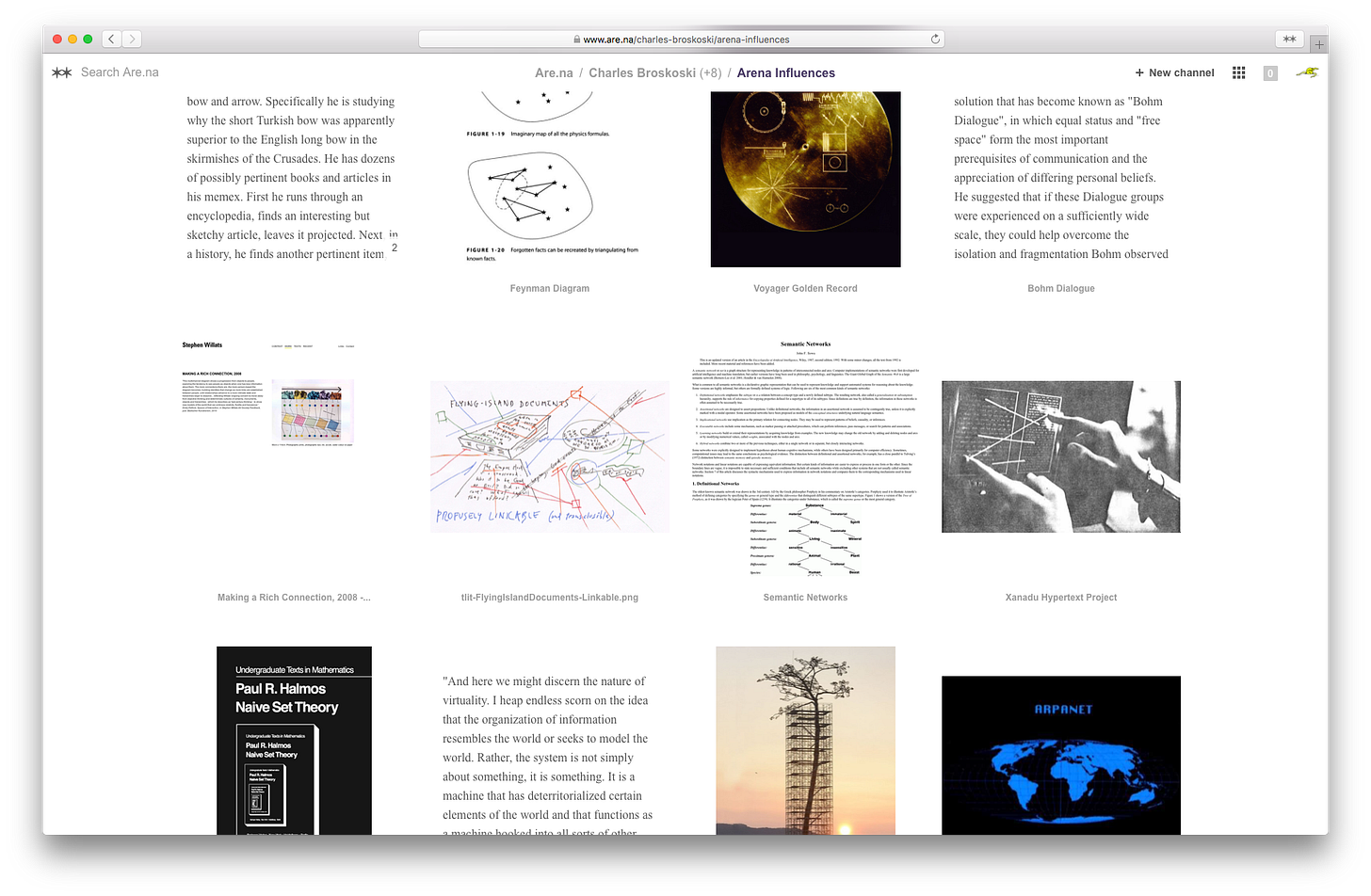📰 Information and Identity
What choices we make aren't enough to define us; it's how and why we choose them that makes us who we are.

Welcome to the 2nd issue of Cathexis, a creative’s take on humanity’s relationship with technology. If you enjoy thought-provoking ramblings, unique collage art, and personally curated links from a curious teenage girl, why not subscribe?
Reflection

They say you are what you consume. For me, what comes to mind are typical anti-obesity posters that'd turn people into human-shaped food monsters: the fit body filled with everything healthy, and the fat body filled with pure junk. These grotesque visualizations were great at deterring big eaters like me from taking another mindless bite. But how would this image look like when it comes to information?
If food cultivates our body, then information cultivates our mind. Imagine our brains filled with the media you consume. "Unhealthy" minds would consist of short-form content like social media, while "healthy" ones would have long-form content like novels. Now, this image is a poster for anti-stupidity, and it's telling you to cut out the "fat". What other way is there than the social media detox, the new fad diet?
However, the problem with this approach is that it sets us up for an unhealthy relationship. Demonizing these man-made things gives them power over us. Like idols, they can take over people's lives, becoming their very identities (e.g. weight watchers and Luddites). Restricting ourselves to a "safe space" doesn't protect us; it only prevents us from living to the fullest. Blogger Lawrence Yeo words this so well:
The less we need to rely on our identities to make sense of information, the more we can learn about the world, and uncover our true place within it.
Retreating from information flows also diminishes our power. According to author Venkatesh Rao, we are all part of a Giant Social Computer in the Cloud (GSCITC), which he describes as "a liquid cloud of human intelligence". Here, our role is determined by the level at which we consume information, along with how long it takes for us to act on it; the less information we can manage, the lower the level of your job will be, and vice versa. Thus, we need an information diet that enables us to translate our consumption/production choices into actionable insights. As a guideline, he created the Attention Management Turnpike model:

This model is based on two concepts: the Observe, Orient, Decide, Act loop (x-axis), and the quote "small minds discuss people, average minds discuss events, great minds discuss ideas" (y-axis). Mapped on this are various forms of media (input), along with their bets (output). If we want to optimize our information diets for success, we need to manage our attention. This requires being aware of your current mind size, and intentionally targeting the zone you want to be in. Keep in mind: no matter what level you work in, you need input from all levels. This is why we need to stay plugged in; information is power.
Instead of unplugging completely, what we can do instead is shift our mindsets. Strip the concerned object of its inherent good/evil, and what's left is a simple tool: a means to an end. For instance, a cognitive reframe from my nutritionist helped me see food no longer as an enemy, but as energy. Keeping this in mind has helped me curb my binge-eating without self-deprivation. The same goes for media consumption; I've been screening everything that I've come across. If an article/podcast/book/etc. didn’t work for me, then I'd drop it. Time and attention are finite resources, so they must be used wisely. Remember: you have agency over yourself. No object can ever take that away from you. If you lost control to such a thing, it's because you chose to.
So are we what we consume? I beg to disagree. Instead, I believe that what choices we make aren't enough to define us; it's how and why we choose them that makes us who we are. For me, I consume because I create. To reach my highest potential as a creator, I must build my inner library, which is done by experiencing life to the fullest. Whether "good" or "bad", every input can become an output. No matter what choices I make, nothing will ever go to waste.
How about you? What’s your information diet like, and how do you make it work for you? Taken from Adweek’s “Information Diet” section, here are some guide questions to help you reflect:
What’s the first information you consume in the morning?
What do you read or watch or listen to at the breakfast table?
What occupies your mind in the car, on the subway, train or bus?
Before bed, do you bite into a novel, graze on Twitter or fast until morning?
Which is more nutritious for you: print or Web?
What’s your biggest digital indulgence?
With such a bloated media universe, how do you cut out the fat?
Curation
🍬 Eye Candy
Threads of Influence
WHAT MADE ME is an interactive installation by artist Dorota Grabkowska that explore what shapes the people of Birmingham. Visitors were asked the following questions:
What made you Think?
What made you Create?
What made you Angry?
What made you Happy?
What made you Change?
Based on their answers, a multi-layered data map was created. The questions were represented by their own colored threads; they'd then be used to connect hundreds of words in a grid. To me, this piece is a manifestation of the word sonder: the time when you realize that everyone's internal lives are as rich and complex as yours. We are connected than we think we are.

Experimental Edibles
Illustrator Ori Toor conceptualized and designed this psychedelic VFX for the short film "TASTE". It tells the story of a chef using state of the art technology to capture new flavors — all to prepare a dish never seen before. Watching this showed me how "originality" comes to be: remixing everything. If more people knew how to take inspiration from their surroundings (just like the main protagonist), imagine how much more creative our world would be. Experience the full film here.


Storytelling Bodies
Psychogeographies is an ongoing series of montages by artist Dustin Yellin, composed of “human microscope slides” that serve as cultural archives. I discovered this after listening to his interview with Tim Ferris, and was just simply blown away…not just because of their craftsmanship, but also because they were so descriptive of us as a human race. Here’s how he describes this series:
I feel like I’m trying to make maps of consciousness. I’m trying to make things that a fucking meteor hits the earth, and maybe one of the things that was left — you dig it out of the dirt, this 3,000-pound glass block, and it could really, almost like a microscope slide, like the DNA of our species can be told through images and through media that’s been found and trapped and preserved. Like frozen movies, they tell stories through collections of ideas.

🤯 Interesting Innovations
We absorb tons of information everyday (e.g. podcasts, articles, etc.), but we just as easily forget them. In order to truly process all this information, we need to take notes. According to content creator Shu Omi, a good note-taking system consists of an idea storage and an idea factory. The former is used to save ideas, while the latter is used to deconstruct them. These broken down ideas are then used to create new ones. Below, I list some recommendations for your note-taking workflow:
Idea Storage

Picture Credits: Shu Omi
Mymind is an app that acts as an extension of your mind. It makes use of artificial intelligence to organize what you save — highlights, images, articles, and more — by automatically creating tags for it. For instance: if you saved a tweet of your favorite author, all you have to do is search the author/topic, and it automatically appears for you. mymind also caught my eye because of how value-driven it was, to the point that it has its own manifesto. This served as the basis of why it has no social features, even if there was a demand for them. Here’s an excerpt of its principles:
In a time when every company has a bid on our data, when we exchange our privacy for information, when every move we make is influenced by how others will perceive it, we have little space to call our own.
Our minds have been taken captive: By social approval systems, by newsfeeds and timelines, by advertisements and corporate agendas. Our information is scattered across platforms, bound by terms and conditions.
What should have never been lost is now yours again.
Here’s to more technology that empowers their users.
Unfortunately, using this app requires a monthly subscription. If you're not willing to pay, here are some free alternatives:

Are.na: A visual organization tool and social networking community, without the clutter of ads or metrics. Here, you can save images, links, files, and text to collections (known as channels), and connect them to others. I love this website so much. It's not only my brain dump (goodbye forgetfulness!), but it's also my daily source of inspiration; I'm always learning from the people in my feed and featured. Follow me here!

Raindrop: Don't like Are.na's 500 block limit? Get Raindrop.io, an all-in-one bookmark manager. Instead of just channels, your unlimited bookmarks can be sorted with collections, tags, and filters. You can also collaborate with others by adding them to your collections; these can be made public for the web too. There's a light and dark themes too, if you care about that.

Slate: Is Raindrop's 60 Mb per month not enough for you? Try Slate, an open-source file storage network. It offers 4 GB (50 GB in the future) for free! This is due to being powered by Filecoin, a decentralized platform for data storage (thanks crypto). Similar to Are.na, it has also a built in community, enabling you to connect with others. Check out this beautiful Slate dedicated to Monet here.
Idea Factory
Our brains are non-linear, so our notes should be too. Linear note- taking boxes us in; it restricting us to categories, preventing us from generating new insights. Our creativity is unlocked when we use technology that matches our cognitive structure, allowing us to connect our thoughts. There's many apps in this category, such as Roam Research and RemNote, but I personally recommend Obsidian. It's a knowledge base built on a local folder of plaint text Markdown files (basically .txt files that you can format for yourself). It encourages you to create links for connecting these files, allowing you to build your own knowledge network. What makes this app the best? You get unparalleled security (local > cloud storage), endless customization (plugins and themes), and a beautiful graph view — all for free.

📖 Long Reads
Interesting articles I wished I could’ve incorporated in this issue’s reflection. If you want to dive deep into the topic of information, these pieces are worth your time.
Letter: Reclaiming Attention: Zat Rana delves into the relationship of information and attention through the lens of conspiracy theories. This article introduced me to information asymmetries, another concept that’s helped me be more mindful of my media consumption habits.
Feeding the Mind: Lewis Carroll’s Rules for a Fine Information Diet and Healthy Intellectual Digestion: Maria Popova highlights how Lewis Caroll uses metaphor for minding our intellectual diets. His words (e.g. mental gluttony, mastication) illustrate this topic much more vividly than I could’ve.
The Truth is Paywalled but the Lies are Free: Nathan Robinson examines what he calls “the political economy of bullshit”, exploring fields like news, academia, and publishing. While reading this enlightened me of systematic inequalities, it also sparked my yearning for the truth.
🧘 Wise Words
We are drowning in information, while starving for wisdom. The world henceforth will be run by synthesizers, people able to put together the right information at the right time, think critically about it, and make important choices wisely.
- E. O. Wilson
Thank You!
Thank you for reading Cathexis today. The positive response I got from last issue was overwhelming; it motivated me to push forward with this issue, despite how much I’ve struggled with it (this topic was so big brain…). I hope you all got to learn from this issue as much as I did while making it.
Enjoyed this post? Share it with a friend, buy me a coffee, or let me know your thoughts.

